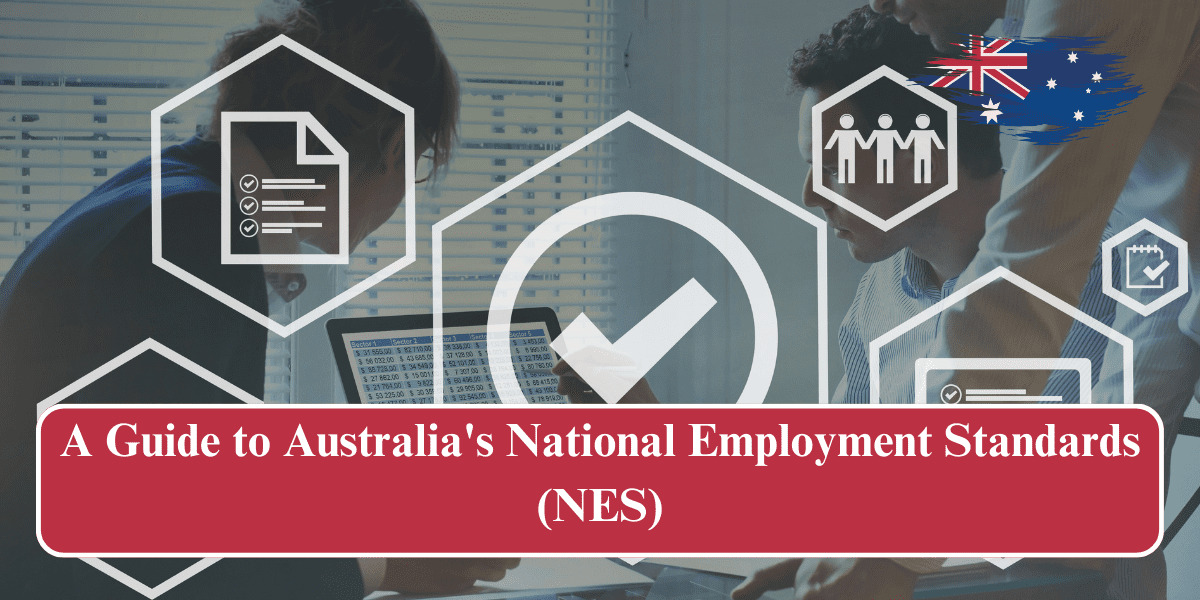We’re breaking down the National Employment Standards (NES) to help you better understand how this piece of legislation impacts your business, contracts, and employees.
Table of Contents
What is the National Employment Standards (NES)?
NES means for “National Employment Standards,” which are the minimum rules for working conditions that all Australians must follow. As these are national standards, they cannot be contracted out of, meaning it is illegal for employers to offer conditions below NES. Any entitlements in awards, enterprise agreements, or employment contracts must meet or exceed the NES. While additional entitlements can be provided, they must not undermine NES.
| Employees Penalty Rates |
| New 120 Sun Bucks Program |
| SCHADS Award Rates |
| Hyp3r Instagram Privacy Breach Class Action |
| Compassionate Leave Australia |
| Annual Leave Calculator Australia |
How many National Employment Standards are there in Australia?
Australia has 11 National Employment Standards covering work hours, flexible work, various types of leave, and termination conditions.
To ensure compliance with NES, here are the 11 employment entitlements and standards:
Maximum Weekly Hours
Employers typically cannot require employees to work more than 38 hours per week. Additional hours must be reasonable, considering the employee’s personal circumstances, job role, family responsibilities, notice given, and whether overtime/penalty rates apply.
Flexible Working Arrangements
Employees who have worked for the same employer for at least 12 months can request flexible working arrangements, such as changes to work hours, patterns, or locations. Employers must reasonably consider requests from eligible employees.
Requests and Offers of Casual Conversion
Casual employees with 12 months of service must be offered conversion to part-time or full-time employment, except for small business employers. This provision does not apply to employers of small businesses.
Parental Entitlements
Employees with 12 months of service are eligible for parental leave entitlements, including maternity, paternity, partner, adoption, and special maternity leave. Employers must adhere to these entitlements to avoid claims of discrimination and unfair dismissal.
Annual Leave
Employees are entitled to a minimum of 4 weeks of annual leave per year, originating from NES. Some awards or agreements may offer more, especially for shift workers due to their strenuous hours.
Personal/Carer’s Leave, Compassionate Leave, and Unpaid Family/Domestic Violence Leave
Employees receive 10 days of personal/carer’s leave annually for illness or caring for ill family members. Compassionate leave is 2 days for serious family illnesses or deaths. Unpaid family and domestic violence leave is up to 5 days.
Community Service Leave
Employees can take leave for voluntary community service, such as jury duty. Other community services are generally unpaid.
Long Service Leave
Long service leave accrues from extended service with the same employer. Although originating from NES, states and territories have their own laws. Pre-modern award employees (before 1 January 2010) follow previous entitlements.
Public Holidays
Employees are entitled to time off on public holidays relevant to their state or territory. For example, NSW public holidays include:
- Monday 2 August – Bank Holiday
- Monday 4 October – Labour Day
- Saturday 25 December – Christmas Day
- Sunday 26 December – Boxing Day
- Monday 27 December – Additional public holiday for Christmas Day
- Tuesday 28 December – Additional public holiday for Boxing Day
Notice of Termination and Redundancy Pay
Notice is required for both termination and redundancy. Employers must provide at least 16 weeks of severance pay for genuine redundancies. A Letter of Resignation is commonly used for giving notice.
Fair Work Information Statement and Casual Employment Information Statement
Employers must provide new employees with these statements outlining NES entitlements, ensuring employees are aware of their rights. These statements are available on the Fair Work website.
National Employment Standards PDF
For more details on NES entitlements, visit the National Employment Standards page on the Fair Work website.
Contact Details
| Contact Method | Details |
|---|---|
| Website | www.fairwork.gov.au |
| Fair Work Infoline | 13 13 94 |
| Translating and Interpreting Service (TIS) | 13 14 50 |
| National Relay Service (NRS) | |
| TTY | 13 36 77 (Ask for 13 13 94) |
| Speak and Listen | 1300 555 727 (Ask for 13 13 94) |
Key Takeaways
The NES comprises 11 employment entitlements that all employers must follow. Awards, enterprise agreements, or contracts may offer additional entitlements but cannot reduce NES standards. The NES aims to ensure consistent and fair employment conditions for all Australian workers.
FAQs
Do the National Employment Standards apply to everyone?
The NES applies to employees in the national workplace relations system, including those under the Fair Work Act 2009, regardless of their award, agreement, or contract. Casual employees are entitled to specific standards like conversion offers, unpaid carer’s leave, compassionate leave, family and domestic violence leave, and community service leave.
How do the NES apply?
Awards, agreements, and contracts cannot provide entitlements below the NES, and those that do are ineffective. They can specify terms like averaging work hours, cashing out leave, substituting public holidays, and redundancy exceptions. They may also offer more favorable entitlements for employees.




